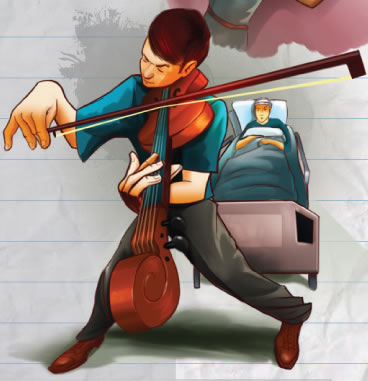In today’s economy, employers pay more attention to the degree you get than ever before. At Best Degree Programs, we decided to take a look at 10 common college degrees that aren’t likely to get you an interview.
High school seniors hoping to major in Latin–think again! While you shouldn’t choose a college major based on how much money you might make, you should think long and hard about getting a college degree that won’t get overlooked when you apply for a job.
The fact is that 31% of recent grads haven’t found a job six months after graduation. That’s the economy we live in.
Now more than ever you should choose a degree that gets you noticed and hired.
What Are Bad Majors?
What makes a major bad is subjective. You should study what you love and what you’re passionate about. Employers look for people who perform. And the best performers are those aligned with their purpose.
But for the sake of this article, we defined a bad major as one that makes it difficult to:
- Find a job after graduation (based on unemployment rates)
- Make good money after college (based on average salaries)
- Find both a lucrative career and one that pays you well
Since there are many reasons why a major might make it hard for you to find a job after you graduate or pay you livable wages, you should do your own market research on majors you’re considering.
But here are several reasons why a major might end up on a list of the worst degrees to get.
1. Competition is fierce.
If competition in a field is high, it makes it harder for recent college grads to break into the field.
2. Limited demand.
If there is low demand for a person with that major, earnings won’t be as high. You might also find it hard to land a job. The bottom line is that demand drives jobs and pay. Without it, you could have trouble finding a job with good pay.
3. You need a graduate degree.
A bachelor’s degree might not be enough to land a job or gain success in the field. Entry-level job opportunities might want master’s degrees instead of bachelor’s degrees. To find gainful employment, you might have to go back to school. You might even have to take out a student loan to do it.
Majors With High Unemployment Rates
Architecture
The worst degree to get at the current time is architecture. 13.9% of recent architecture graduates can’t find work.
Slow down in construction in certain areas has stopped the hiring of new architects. Improved technology and software have also slowed down hiring. As software improves productivity, it also slows down the need to hire more workers in the field.
Humanities
The next set of majors falls under the Humanities or Liberal Arts banner. This includes subjects like English Literature, Latin, Theology, and a Theater Arts degree. 9.4% of recent graduates in these majors have trouble finding work. That’s almost 10%, making these humanities subjects some of the worst majors due to high unemployment rates.
Social Sciences
After the humanities, you have the social sciences. This includes some of the worst college majors like American Studies, Criminal Justice, Economics, and Sociology.
Sociology
Since sociology is one of the most popular majors in colleges, it might come as a surprise to find it on a list of bad degrees. But the truth is that social sciences, such as sociology and communications majors, don’t pay well.
Is sociology a useless degree? Well, the answer depends on where, and if, you find a job. Since you find most sociology job postings in the public sector, your earnings tend to be less than private sector jobs.
The unemployment rate for students with sociology degrees also makes the college major a bad one. Sociology majors struggle to find work due to the jobless rate. Still, sociology remains a popular major.
But its popularity also impacts finding a job right out of college. With a large number of sociology majors flooding the workforce each year, there aren’t enough jobs for everyone. As a result, we see a high unemployment rate associated with this major, making it one of the worst college majors to pursue.
Other Social Science Majors
What about political science? Is it a bad degree to get?
Like sociology, you find most political science job postings in the public sector. As a result, you earn less in public than in private sector jobs.
If you want to make money with this major, plan on getting an advanced college degree. Lawyers and political analysts have advanced degrees. You might need a master’s degree or to go to law school to work in a good-paying job in the field.
But if you’re willing to go to law school, take out a student loan, and face fierce competition, your efforts might be rewarded with higher pay.
Majors With Low Earnings Potential
If your main goal out of college is to make money, then you might want to avoid a job in the liberal arts, humanities, and social sciences. Things like Poetry, Art History, Music Therapy, or even something as bizarre as Puppetry (yes, this is a real major) should be avoided.
Based on an NCES report, there are certain degrees to avoid if money is your primary concern after college. Majors listed on this report show low earnings for college graduates.
The report lists some of the worst majors and median annual earnings for college grads with bachelor’s degrees. Median earnings offer accurate readings of pay for this group of individuals. They are often more accurate than average earnings because they remove high and low outliers that skew average earnings numbers.
Majors to avoid because of a low average salary
- Liberal arts and humanities: $40,300/year
- Social work and human services: $40,500/year
- Elementary education: $40,500/year
- Fine arts: $40,500/year
- General education: $41,300/year
- Psychology: $41,400/year
- Criminal justice and fire protection: $41,800/year
- Education, other: $43,000/year
- Sociology: $43,100/year
- English language and literature: $44,600/year
- History: $45,100/year
- Linguistics and comparative language and literature: $45,400/year
- Physical fitness, parks, recreation, and leisure: $45,500/year
For reference, information on this list is for graduates aged 25-29 with bachelor’s degrees. When the report was created, the median annual salary for this group of individuals was $54,700.
Majors with Low Unemployment Rates
Other majors with low unemployment rates
- Electrical engineering: 1.9%
- Finance: 2.1%
- Physical fitness, parks, recreation, and leisure: 2.1%
- General medical and health services: 2.3%
- Accounting: 2.3%
- Economics: 2.3%
- Business management and administration: 2.4%
- General engineering: 2.4%
- Biology: 2.4%
- Mathematics: 2.5%
- Sociology: 2.7%
- Non-STEM fields: 2.9%
- Marketing and marketing research: 2.9%
For reference, the average unemployment rate for college grads with bachelor’s degrees is 2.9%.
Majors With High Earnings Potential
It’s important to discuss majors with high earnings potential when talking about those with low earnings. This gives you an idea of how the two compare.
Fields of study with a high average salary include:
- Electrical engineering: $78,700/year
- Mechanical engineering: $74,000/year
- Engineering, other: $70,500/year
- Computer and information sciences: $70,100/year
- General engineering: $68,900/year
- Finance: $65,300/year
- Economics: $64,900/year
- STEM fields: $60,800/year
- Accounting: $60,000/year
- Nursing: $58,700/year
- Mathematics: $54,600/year
As stated above, college grads aged 25-29 with a bachelor’s degree earn a median salary of $54,700.
Are you doomed with a bad degree?
In short, no. Even with what you believe are the dumbest college majors, you can still find success. But you might need to work harder and smarter.
Many students gain success after college. They find fulfilling careers that offer a stable income even with some of the top “useless” degrees. While they may not earn high salaries from the jump, they improve their employment prospects over time.
But if you’re worried that you might never see a return on your investment, there are two reasons why you shouldn’t be too concerned about going with one of the dumbest majors. Remember, what makes a major “bad” is subjective. Makes sense, right?
Okay. So what are some good degrees? Right now you can’t go wrong with either Education or Health. Graduates with degrees in these two disciplines are best positioned for employment. Education majors see many job postings right out of college since they offer a low unemployment rate.
However, there are plenty of best college majors. Engineering, sciences, computers and IT, business, psychology, social work, and media and communications are some examples.
Your major is flexible.
Let’s say you majored in liberal arts and you think it’s one of the worst college majors out there. While broad in scope, your major doesn’t lock you into one field. In fact, your major is flexible.
If you’re worried about finding a job or making money right after graduation, know that you can switch gears and find entry-level work that’s not related to your major.
If you graduated with a psychology or sociology degree, you might consider working in business or marketing. After all, your major provided you with insight on human behavior. If you can show your unique qualifications to a potential employer, you might land a job.
Besides, employers value your skills and work experience over the major you chose in college. But you might have to spend time working your way up the ladder to earn good wages. Plan on starting your career in an entry-level position. This is common for college graduates.
You can go back to school.
Education statistics show graduate degrees can lead to salary increases and job security. Some bachelor’s degrees in certain fields won’t land you a job without a master’s.
For example, it’s hard to find work with a bachelor’s in psychology. But a graduate degree in psychology opens doors to different jobs with higher wages.
While this is not true of every major, you should investigate whether a graduate degree will benefit your future career. If so, consider a master’s, professional degree, or doctorate.
Earn a graduate degree
But graduate degrees are expensive. Financial aid comes with limitations and major student loan debt. But advanced degrees can pay off in the long run with higher salaries and better prospects for jobs. This offsets student loan debt.
If you’re okay with returning to school and taking out a student loan to cover the costs, a graduate degree might improve your prospects.
And if you’re still worried about job options with your current major, know that you can always pursue a graduate degree in a new field. You aren’t locked into one major your entire life.
Bad Majors: Tips to Help You Stay Employed and Paid
Is graphic design a bad major? Will sociology pay back your student loan?
You’ve chosen a bad major, and plan to stick with it, now what?
It’s important to remember to be proud of your major, even if it’s listed as one of the bad degrees to get. Here are some things you can do to keep yourself employed and paid.
Have a Plan
Knowing your career plan helps. But how do you make one? First, you need to ask yourself important questions.
Do you plan to stay in your field?
If so, look for job postings related to your major. For example, look for jobs for graphic designers if you have a degree in the subject. If not, look for ways to branch out and use your degree in other fields.
Should you go to grad school?
Ask yourself if a graduate degree will improve your employment prospects. Is it harder to get an entry-level job without a master’s? If so, you might consider graduate school as an option.
Are there ways to get experience now?
To be better prepared for entry-level work after you graduate, consider getting experience while still in college. You can do this by interning or getting a part-time job in the field. When you apply for a job after graduation, you will have work experience. You might even qualify for a permanent position at the company you where you interned.
What are you passionate about?
What excites you? What do you love reading about? If you know your interests and passions, it won’t be hard to find a major you love. But you should also see how it fits into your career plan.
Know What to Expect
Don’t get blindsided when you graduate. If you have a career in mind, research it. You can use websites such as the Bureau of Labor Statistics and PayScale to get more information on job prospects and average salary earnings.
If you do your research early enough, you can always pivot to another major or another career path. Doing your homework on career prospects will prevent surprises later.
Meet with Your College Counselor About the Most Useless Degrees
Your career counselor is an important person during your college years. But many students don’t take advantage of this helpful resource.
Through your school’s career center, you can schedule a meeting with a counselor. They can provide you with information about your career path options. They can also give you assessments to explore your strengths and interests. They might even offer job earnings and growth information on a particular career.
Your career counselor might also provide you with job postings and contacts in your field. You can meet with graduates doing the exact job you want to do. Some of them might even be working where you want to work.
Meet with Other Graduates
If your school has an alumni network, take advantage of this resource. Find ways to connect with graduates in your major. But if you can’t find alumni to connect with, meet with other graduates working in your major.
Ask Questions
- Are you happy with your job in criminal justice?
- Was it hard to find work in graphic design after you graduated?
- Are you working in the same field you started in?
- Was your median starting salary satisfactory?
- How many job postings were related to your business degree?
Some of the answers you get might be subjective. While it’s important to do your research, remember your own career paths might vary depending on your schooling and work experience. Everyone’s journey is personal.
Over time, your questions will shift as your career goals change. Keep a career notebook or journal and begin planning for your future. With a little planning, you never know where it might take you.
What to Do with These 9 Top Useless Degrees
Let’s look at some specific degrees. Some consider these nine degrees as the worst ones to get. But as you learned above, there are ways to turn your bad degree into a good one.
Animal Science
Love animals? Are you a vegetarian because of this love? Then this major may not suit you.
As an animal science major, you study animals. But you also focus on the role of animals in food production.
This means you work closely with agricultural animals, such as chickens and cows, to learn how they can feed the human population.
The good news is that you’re focusing your attention on how to provide safer, healthier, and more efficient ways to feed humans. And with an increase in public awareness on health, demand for animal scientists rises. In fact, over the next decade, growth will rise 11%.
But if you’re opposed to a carnivore lifestyle, this college degree won’t work for you.
Art
Despite report of high unemployment rates and low pay for art majors, there are ways around getting stuck with a bad art degree. If you’re committed to studying art, make your college degree pay off by choosing the right school.
Based on “return on investment” calculations from PayScale, top-ranking art schools make all the difference for arts majors.
“Worst” college majors in art:
- Dramatic arts
- Fine arts
- Industrial design
- Music
Top-ranking art schools include Georgia Institute of Technology and Stanford University. These schools can be costly but offer strong financial aid packages to qualifying students.
Andy Warhol said, “Being good in business is the most fascinating kind of art.” He also said making money is art. So, if you can, become as good a businessperson as you are an artist. Leverage your talents so you can pay your bills and have some money left over to invest in your future.
Unfortunately, fine artists collect little pay. Their earnings depend on demand and other people’s discretionary income. During tough economic times, people buy less art. They see it as frivolous spending. As a result, monthly budgets don’t include art purchases.
But today’s artists have become creative in other ways. They are fashion designers and graphic designers who have learned how to leverage their art online. They brand their artistic skills on social media. And they find unique ways to sell their art. Sites like Etsy and ArtPal offer ways to connect to buyers. Here you can sell crafts, handmade jewelry, paintings, photography, prints, and sculptures.
Art History
The key to finding work and earning good wages as an art history major is to get an advanced degree. Knowing this as you start your journey helps. You won’t be blindsided with limited jobs after graduation.
Those who find work as museum technicians and conservators earn a lean median salary of about $42,000/year. But most conservators have master’s degrees.
If you’re willing to attend college and earn a master’s in art history, you should have the best prospects. A master’s degree will also bump up your median pay.
You can also improve your career prospects by picking up a minor. But the best way to land a job as an archivist, conservator, or curator is to get a master’s degree.
Right now, the Bureau of Labor Statistics projects 19% job growth for archivists, curators, and museum workers. Due to recovery efforts from the COVID-19 recession, employment growth will continue over the next decade. As a result, it’s a great time to pursue a college degree in art history.
Athletic Training
The broader field of recreation and fitness is a good choice for those interested in healthcare but who don’t want to earn a STEM degree. The starting salary is low for athletic trainers. But if you love sports and want a career that doesn’t force you into a cubicle, consider becoming an athletic trainer.
Starting salary for this job is $39,500/year. It offers strong growth of 23% over the next ten years. The field, though, remains small. There aren’t as many job openings listed online as there are in other healthcare careers.
Since potential employers don’t actively seek out workers with athletic training majors, you should diversify your degree. You do this by getting licensed or certified. You can also pick up a minor in business administration or education.
But to put even the most useless degrees to work, think about picking up a master’s that will lead you into administrative and director roles. These jobs pay higher wages.
Education
Education might seem like a useful degree. You want to teach children? You earn a college degree in education.
But education majors must declare a specialty. Specialties include:
- Early childhood education
- Secondary education
- Special education
Some of the above specialties require students to earn a master’s degree if they plan to teach in that area. And if you want to specialize in your practice, you can’t graduate with only a general education degree.
You might also need certifications and licenses to teach in a particular field. And if you want to go into administration, you will need a master’s and additional training and endorsements. The extra work is costly and takes time.
But if you know what’s required going in, you can structure your major to serve you. Likely, you’ll find work with the right credentials. Growth should remain above the average for the next ten years.
English Literature
One of the best ways to leverage your English literature degree is to develop strong relationships with your peers and professors.
Why are relationships important for English majors? Because relationships are critical in the literary world, media, and publishing.
Besides a strong network, good relationships provide you with excellent feedback and critique. If you’re planning to write a novel or screenplay, it’s important to workshop your pages before you send them to an agent or publishing house.
As an English major, you can also open doors to internships with publishing houses or media outlets. Internships are vital to English and creative writing majors. They open doors to connections and help leverage your English or creative writing degree.
Hospitality and Tourism
Since the travel industry ebbs and flows, the future for hospitality and tourism majors is uncertain. Travel depends on discretionary funds. Without it, people travel less.
Job growth for this industry remains stable, so it’s not as bad of a major as one might think. Job growth for lodging managers is 9%, which is about average. But food service managers see a 15% growth in jobs.
The median annual salary for lodging managers is about $44,000/year, but you can improve your earnings by picking up a management major. Instead of majoring in hospitality or tourism, try to find college majors with the word management in the title. This is the degree most major hotel chains look for.
By earning a management degree, you can turn your $44,000/year into over $80,000/year by mid-career. A management degree can also open doors to other fields of management in culinary arts and hospitality.
Photography
You might want to adjust your focus when majoring in photography. Specialize in a field with job growth. Currently, job growth for this career is 17% but earnings remain lower than average.
Because a growing number of people pick up photography as a hobby or to earn extra money, median pay drops. The lean paycheck may also be unsteady.
Businesses hire freelance photographers to do work. They rarely have a photographer on staff. As a result, over half of all photographers are self-employed.
But formal education and experience can help leverage your prospects and build your career. While in college, plan to diversify your degree by taking business, computer science, or graphic design classes. Even pick up a psychology class since your work requires interaction with the public.
While in school, you should also work with a mentor who can train you on special skills and techniques used in the field.
Religious Studies and Theology
If you feel you have a true spiritual calling, you don’t have to forego it for money’s sake. But you need to keep your expectations in check.
Religious studies majors in administrative roles can earn a starting salary over $40,000/year. Clergy members make over $44,000/year from the start. But most religious workers earn less than $30,000/year.
So, what can you do with a religious studies major that won’t have you begging for money? Diversify your major.
If you can, pick up a minor or a second major with a higher demand. Some religious studies students earn a specific degree in philosophy because the two subjects are related. Philosophy majors also offers better employment prospects and a higher median starting salary. The median salary is $48,200/year.
You can also focus on certain skills, such as writing and critical thinking, that will give you better job options.
Other College Degrees and Majors That Can Be Turned Around
- Advertising degree
- Business administration degree
- Computer science degree
- Criminal justice majors
- Culinary arts majors
- Graphic design degree
- Tourism degree
How to Make the Most Out of the “Worst” Majors
In this article, we define “bad” and “worst” majors as those with limited jobs and below average salary. But it’s important to remember you can’t go wrong if you choose a major you’re passionate about and want to use in your career.
It also doesn’t matter if you found your major listed here. If you love what you’re studying and see a future using it, then chances are you picked the right major.
But you should avoid these college majors if your main concerns are:
- Job prospects
- Median starting salary
These college majors might not be for you.
But what do you do if you’ve chosen one of the “worst” majors and don’t want to give it up? Does it mean you won’t find a job or money?
As mentioned above, there are ways to turn your “bad” major into a lucrative career.
BDP Staff
April 2022
Related:
Top 10 Best Majors for Indecisive Students
Top 20 Degrees for the Future
30 Great Degree Programs for Working Adults
30 Great Small Colleges for STEM Degrees









